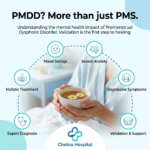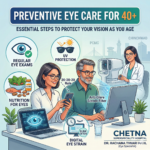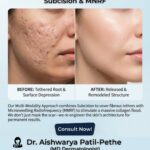Do your eyes feel itchy, irritated, or watery all the time? You may assume it’s just an allergy or the weather change—but what if it’s something else? In many cases, people confuse eye allergies with Dry Eye Syndrome, as both share similar symptoms. However, their causes, treatments, and care approaches are quite different. Understanding the distinction is crucial for effective relief and long-term eye health.
Common Symptoms of Eye Allergies
Eye allergies, also known as allergic conjunctivitis, occur when the eyes react to allergens such as dust, pollen, mold, pet dander, or smoke. These allergens trigger the release of histamines in the body, leading to:
- Redness and swelling of the eyes
- Intense itching
- Watery discharge
- Sneezing and nasal congestion (often occurs together)
- Burning sensation
Eye allergies often affect both eyes and are seasonal or environment-related. If you find your symptoms worsening in spring, during cleaning, or when exposed to pets, an allergy is the likely culprit.
What is Dry Eye Syndrome?
Dry Eye Syndrome, on the other hand, is caused when your eyes do not produce enough tears or the quality of tears is poor. This leads to dryness and irritation of the eye surface. Symptoms include:
- Gritty or sandy feeling in the eyes
- Burning sensation
- Blurred vision, especially after screen use
- Stringy mucus
- Increased sensitivity to light
- Temporary excessive tearing (a reflex to dryness)
Dry eyes are more common among people who spend long hours on computers or phones, wear contact lenses, or are exposed to air-conditioning regularly. Women, especially after menopause, are also more likely to experience dry eye issues due to hormonal changes.
Allergy vs. Dry Eye: How to Tell the Difference?
| Symptom | Eye Allergy | Dry Eye Syndrome |
|---|---|---|
| Itching | Severe | Mild to none |
| Redness | Common | Common |
| Watery eyes | Constant | Reflex tearing |
| Grittiness | Rare | Common |
| Blurred vision | Sometimes | Frequently |
| Triggers | Allergens | Screens, AC, aging |
While there may be some overlap, the presence of nasal symptoms (like sneezing or congestion) usually indicates an allergy. Conversely, discomfort that worsens with screen time or in dry environments is more typical of dry eyes.
Why a Professional Eye Check-Up Matters
Many people try over-the-counter eye drops without knowing the exact cause of their symptoms. This may lead to worsening of the condition if the wrong product is used. That’s why consulting an eye specialist is essential.
At Chetna Multispeciality Hospital, Chinchwad, our Consultant Ophthalmologist Dr. Rachana Tiwari offers comprehensive diagnosis and personalized treatment for both eye allergies and dry eye syndrome.
Whether it’s antihistamine drops for allergies or tear substitutes and lifestyle changes for dry eyes, proper care begins with a correct diagnosis.
Book Appointment – https://forms.gle/NykcSCB8JQWym6CW7
Contact us on 9168690448 / 9158681123
Website – www.chetnahospital.co.in
Address – Chetna Hospital, Sambhajinagar, MIDC, G Block, Near Rotary Club, Chinchwad 411019
.
.
.
#hospital #pune #pcmc #chinchwad #medical #medicalservices #dryeyetreatment #dryeyerelief #dryeyedisease #dryeyetherapy #catract #catractsurgery #catracteyesurgery #catracteyeoperation #eyedoctor #eye #glaucoma #conjunctivitis #ophthalmologist #eyediseases #eyepain #pinkeye #hazeleyes #myopia #eyeinfection #amblyopia #dryeyesyndrome #eyeproblems #motibindu #motibinduoperation













